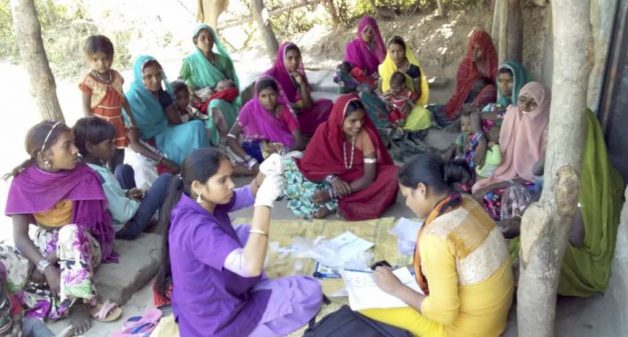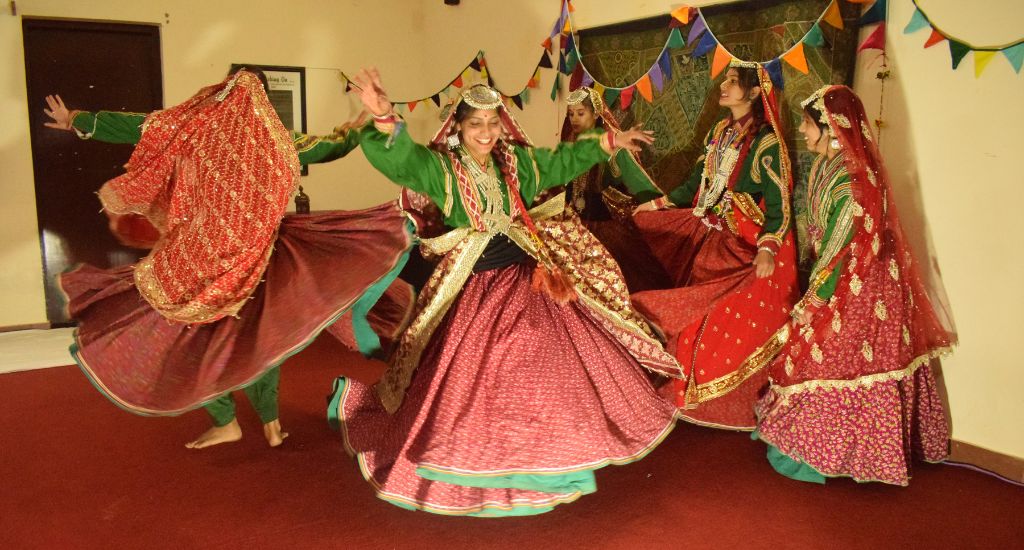“For the first time, a nurse visited our village and checked the pregnant women in our community,” said Kanha of Nathiya Thal village. The village, though 50km from Udaipur, is one of the remotest, with the surrounding hills making access difficult. “We have always relied on bhopas (traditional healers ). In emergency situations, the patients used to be carried across the hills to hospitals,” said Kanha.
Literacy level in the community is low at 20%. In a span of one year, the village with 98 households saw one maternal death and the death of two infants. Like Nathiya Thal, southern Rajasthan comprising of Udaipur, Dungarpur and Banswara districts is a highly rural, Adivasi belt with the lowest Human Development Index.
Prevalence of diseases such as malaria and tuberculosis is much higher in this region than the country’s average. High levels of malnutrition and disease burden have contributed to morbidities and mortalities, which are also higher than the national average.
Given this context, a team of Nurse Practitioners, all of whom belong to similar rural areas in the region, and 97% of them belonging to the Adivasi communities, is transforming the healthcare scenario in the underserved villages.
Rural clinics
As per World Health Organization’s study The Health Workforce in India, the number of doctors in urban areas is four times that in rural areas, while 73% of the population resides in the latter. Sustainable Development Goals 3 underlining equitable health and well-being for all has prompted many states to build cadres of mid-level healthcare providers than focusing on standalone physician models.

Six primary healthcare clinics called AMRIT, meaning life-giving elixir, were set up in three of the predominantly tribal, remote blocks of southern Rajasthan. Basic HealthCare Services, a non-profit organization, established them.
The clinics cater to a rural population of 78,000. At each clinic, a team of Nurse Practitioners provides comprehensive services that include prevention of illnesses, treatment of diseases, and round-the-clock emergency.
Specialized training
Young women of this region, who have studied General Nursing and Midwifery (GNM) or B.Sc Nursing and intensively trained in primary healthcare, manage the clinics. Physicians who mentor the trainees provide round-the-clock tele-consultation support and visit the clinic once a week.
The nurses undergo intensive one-and-half months induction training as soon as they are recruited. As they have to man the clinics on their own, they learn to work independently. They learn to assess a patient, get their medical history, follow immunization routine, and calculate drug doses.
In addition, there are bimonthly trainings on clinical care, procedures, infection control and effective communication. The regular and other exposure trainings equip the nurses with management of childhood illnesses, antenatal and postnatal care, family planning and contraception, etc.
Connecting with communities
“The women had never heard of antenatal check-up. It took years to break barriers and build a rapport with the community,” Ramila Meena, a senior nurse from the same community, who has attended to more than 21,000 patients, and 300 deliveries including complicated ones, told VillageSquare.in. “ Today, we have brought down home deliveries from 97% to 15%.”
In a span of five years, the nurses have managed more than 85,000 cases, with illnesses ranging from infections to non-communicable diseases, skin conditions to injuries, along with maternal and child health services. The presence of the female care providers has made more women (54%) and children (13%) seek treatment at the clinics.
In areas lacking in government Primary Health Centers, a nurse and a health worker go to remote villages on a motorcycle and provide essential antenatal, postnatal, contraceptive services, health education and follow up with chronic patients. A closer connect with the community and patients has enabled families to continue to seek healthcare services.
Treating tuberculosis
“In illnesses like tuberculosis (TB), we make sure the person understands the illness, stays in good cheer, receives support from the family and takes medicines on time,” Hansa told VillageSquare.in.
She recalled an instance when she and her team had to attend to a patient late at night, in a village 5km from the clinic. The team mobilized neighbors to bring the young boy to the clinic. The nurses stabilized the patient’s condition and referred ahead. Later he started his treatment for TB at the clinic.

Within nine months the boy recovered and also overcame malnutrition. “He visits our clinic now and then, and motivates other patients to take care of their health,” said Hansa. So far, AMRIT clinics have treated more than 600 tuberculosis patients and the cure rate has increased to 73% in the past two years.
Breaking stereotypes
The primary healthcare nurses at AMRIT clinics have their own stories of overcoming difficult personal situations with grit, and breaking stereotypes. Hansa keeps her one-year old child in the nearby day-care crèche during the day, while she manages patients at the clinic.
“I was six months pregnant when I appeared for my B.Sc Nursing final exam. My friends told me to quit and rest at home. I knew I wanted to become a nurse – the first one in our community. And here I am,” Ramila told VillageSquare.in.
Nurse Rekha said, “I wanted to study but I was married as soon as I completed my schooling. Since my husband supported me, I could finish nursing, having two children in the meanwhile.” She worked at a private hospital and then joined AMRIT clinics.
Beyond secondary roles
Imparting skills to the nurses for varied conditions has empowered them in their role that goes beyond the traditional secondary functions of nursing. “It was 11pm in the night and for the first time I conducted a normal delivery of twins! I was nervous. I had never seen two placenta, but I knew I could manage it. And my team and I did it,” said Ramila.
Redefining their roles and taking pride and ownership in their work, they are content in their personal lives as well. “I feel proud that I am able to earn well for my family today while my husband is pursuing his studies. He takes care of my children at home,” Rekha told VillageSquare.in.
“It’s magic we create! You deliver a tiny baby and in a matter of months you see the little child chirpily walk to the clinic with his parents,” said Dipika, one of the head nurses in a clinic in a remote panchayat in Gogunda Block. “Working here is not easy like in the cities. But we have grown. I have become fearless and confident. I not only can cure patients but can travel anywhere and yes, even send emails!”
In a country with patriarchal norms governing decisions around girl children, the pursuit of higher education, a career or women’s role in working for the society is rare, especially in rural pockets. These nurses work with a determination to provide quality healthcare to rural Rajasthan.
Manisha Dutta works as a program executive with Basic HealthCare Services, Udaipur. Views are personal.


